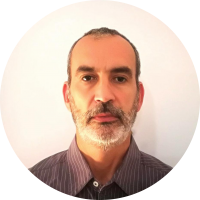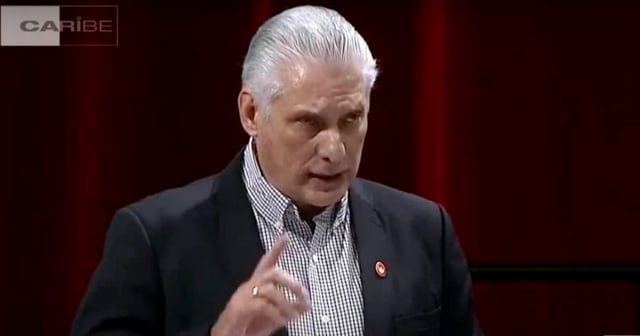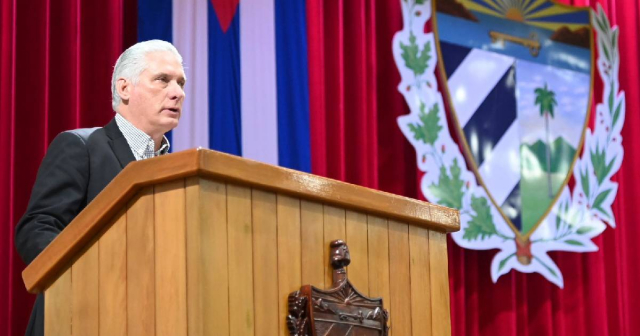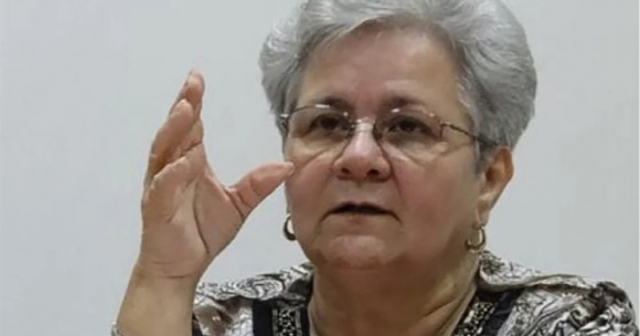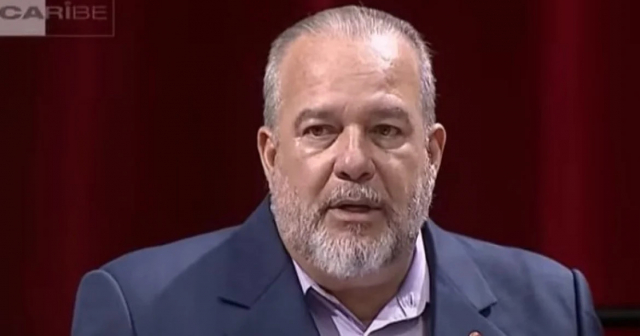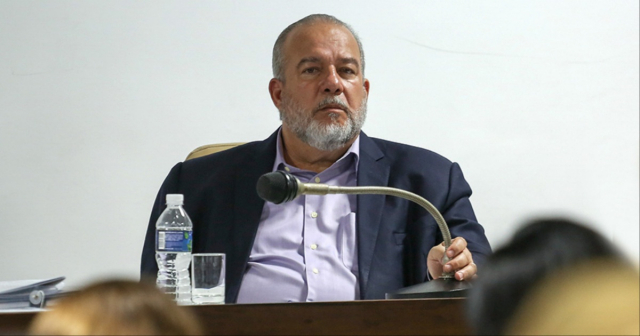The ruling Miguel Díaz-Canel once again defended the Cuban political system and the unanimous approval of its laws in the National Assembly of People's Power (ANPP), something he considered characteristic of a "rare dictatorship" like the Cuban one, guided and driven by the interests of the people.
In the closing speech of the third ordinary session of the X Legislature of the ANPP, the also First Secretary of the Communist Party of Cuba (PCC) justified the procedure for the ratification of laws by the Cuban parliament, which has often been criticized for the "unanimity" displayed, with no open opposition or votes against, typical of the democratic façades exhibited by totalitarian regimes.
"The National Assembly, the sum and synthesis of the country we are, unanimously votes on almost all its agreements. This provokes no small number of criticisms from those who are unaware that behind this unanimity lie long and intense days of work, debate, and the search for consensus in the interest of the collective," said Díaz-Canel.
According to the ruler appointed by General Raúl Castro, the unanimous vote of the Cuban parliamentarians conceals a arduous process of "debate and search for consensus" that supposedly reflects the diversity of opinions of the citizens and voters represented by the deputies of the ANPP. However, Díaz-Canel failed to notice that this diversity of opinions and visions for the country is nullified when laws are adopted unanimously.
"I believe it's worth saying. Cuba is not run by one person, not even a small group of people. This is the rare dictatorship that the enemies of the revolution will never be able to understand. The dictatorship of the workers. The dictatorship of the people that we, gathered here by popular election, represent," the leader stated.
Those who cannot understand how the Cuban "democracy" works (that "strange dictatorship," according to Díaz-Canel) immediately join the ranks of the so-called "enemies of the revolution" and are excluded as subjects of political rights in the Cuban regime, which has been enacting laws by decree or through unanimous votes of the deputies for over 60 years.
"It is now our responsibility to change what must be changed and to advance on the path we began 65 years ago to emancipate ourselves through our own efforts according to the concept of revolution bequeathed to us by Commander in Chief Fidel Castro Ruz," reaffirmed Díaz-Canel in his speech.
According to the ruler, in the third ordinary session of the X Legislature of the ANPP, various issues have been "discussed and agreed upon, all very sensitive for the Cuban nation," such as the price cap imposed on the "new economic actors," the production and distribution of food, and the correction of other distortions to boost the economy.
In addition to the vague and incoherent propaganda rhetoric of the regime, Díaz-Canel also had words to criticize the political systems of advanced Western democracies, which he described as "masks displayed in the windows of the empire." With his invective, the occupant of the Palace dismissed in one fell swoop all the support and solidarity expressed by parliamentarians from those same democracies, as well as the initiatives promoted from their seats.
"We will never accept as valid the masquerade of democracy that is displayed in the showcases of the empire, where candidates are assessed by the amount of money given to them. And where the candidates are those who manage to raise funds and instead of proposing real changes to the major problems of their country, each one tries to defeat their opponent with disqualifications and insults," he stated.
He also referred to the U.S. Congress as the place "where honest legislators interested in serving their communities are forced to legislate alongside real bandits, servants of lobbyists, arms dealers, and other infamous businesses that have supported anti-Cuba policies for decades as if it were a matter of domestic politics."
"If something honors us as a nation, it is the integration of this Assembly, the genuinely Cuban character of each legislature, where no extra fees are paid," concluded the ruler, prompting unanimous applause from the conclave.
The "rare dictatorship" of Díaz-Canel and the juggling of "continuity" to legitimize the inherited totalitarian regime.
In a speech delivered during the closing of the III Plenary of the Central Committee of the Communist Party of Cuba (PCC) in December 2021, the first secretary of the only legal party in the country once again ignored the principle of reality and described a Cuba besieged by "external enemies," but triumphant with the support and creativity of a joyful people.
With his back to the reality documented by non-governmental organizations (NGOs) like Cubalex and disseminated by independent media and social networks, Díaz-Canel denied the existence of more than 1,000 political prisoners who remained behind bars for having taken to the streets to protest during the demonstrations of July 11.
In addition to denying police harassment, threats from State Security, the violence of its repressive forces, and the coercion of activists and opponents exercised from the state terrorism practiced by its totalitarian regime - which manipulates everything from public media to neighborhood "acts of repudiation" - the Cuban leader again attacked the Western democracies that denounce the repression of the Cuban dictatorship.
"This rare dictatorship, whose supposed disappeared or persecuted individuals often reappear strolling through European or North American cities, has a clear record in its treatment of its penal population and has a very high moral standard not to accept accusations against the greatest human rights violators in the world, both inside and outside its country, in Vietnam as well as in Iraq or in the illegally occupied territory by the naval base in Guantánamo," defended Díaz-Canel.
With the usual triumphalist tone of the regime's speeches, Díaz-Canel celebrated the resistance of the Cuban people against all the ills caused by the embargo and the destabilization campaigns orchestrated by the United States, which, according to the official narrative, only mobilize "mercenaries" and "the confused."
"Having a single Party does not make us a dictatorship; it frees us from the struggles and political corruption that harm small and poor nations, where access to positions is permeated by commitments to business elites," he argued.
Days later, during the closing speech of the eighth ordinary session of the ANPP, Díaz-Canel Bermúdez questioned the labeling of the Cuban regime as a tyranny or dictatorship, and considered that Cuba is subjected to campaigns that seek to demonize its political system, presenting it as arbitrary and despotic, without adherence to the current Constitution.
Furthermore, he boasted about democracy when referring to the new Family Code, a law that, according to him, was only “possible in a democracy and that strengthens our commitment to promote, recognize, and protect human rights and diversity.”
He also said that those who label Cuba as a "failed state (...) try to label this revolution, which in "successive acts of heroic creation has become an example."
"The Cuba of the 21st century is the one that is denigrated and blocked. It is the same Cuba that progresses in the improvement of its legal framework, fulfilling constitutional mandates," he added.
The day after the historic protests of July 11, 2021 (11J), the ruler denied that the government was "inefficient" and that there was a dictatorship on the island.
“Don’t tell me that the blame is on the inefficient government, on the brutal government or dictatorship... What is the dictatorship that exists in Cuba?” asked Díaz-Canel during an informal meeting with the state media in San Antonio de los Baños, a town in Artemisa that sparked the protests.
"The dictatorship that is meant for everyone to be a little better, the dictatorship we create for all. That is the dictatorship...", Díaz-Canel answered himself; he argued that what happened during the day of protests was "an expression of how much there is an attempt to discredit, to manipulate people when they are in situations of vulnerability."
The ruler referred to a discourse of "double standards" and urged the United States government to lift "the blockade" if it wanted "the Cuban people to be better off."
"All of this is done to discredit, to dismantle, to provoke, and we came here to, alongside the revolutionaries of this town, demonstrate that here the streets belong to the revolutionaries, and that here no worm or counter-revolutionary is going to take our streets. And if they provoke, we will confront them. We are willing to give our lives for this revolution," said Díaz-Canel, while being cheered by a group of people.
What do you think?
VIEW COMMENTS (4)Filed under:
